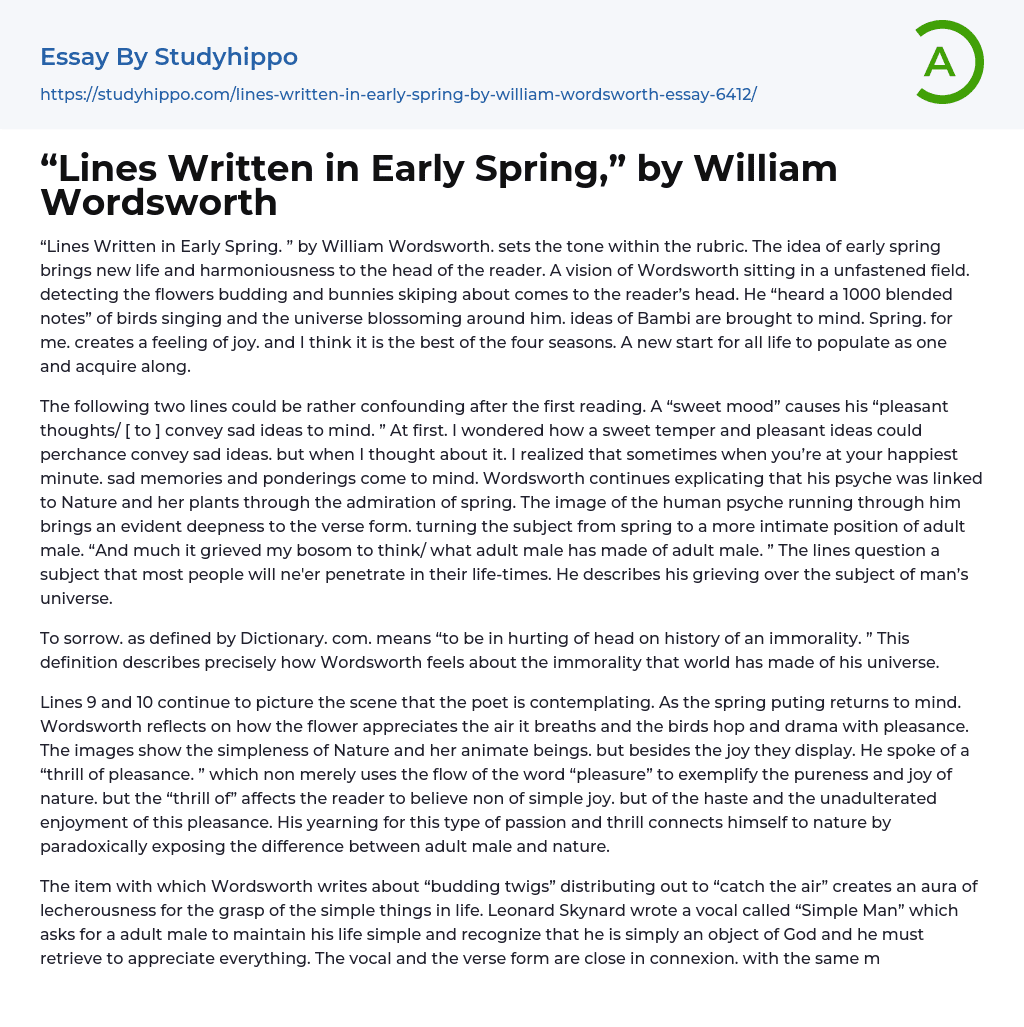

“Lines Written in Early Spring,” by William Wordsworth Essay Example
"Lines Written in Early Spring" by William Wordsworth sets a tone of rejuvenation and harmony. The reader envisions Wordsworth sitting in an open field, observing budding flowers and playful bunnies. The sounds of birds singing and the world blossoming fill his senses. This evokes thoughts of Bambi and the joy that spring brings, making it the best season. Spring represents a fresh start for all beings to coexist peacefully. However, the following lines may initially confuse the reader. Wordsworth mentions a "sweet mood" that paradoxically brings forth sad thoughts. Upon reflection, it becomes clear that even in moments of happiness, sad memories can resurface. Wordsworth then explains how his soul is connected to Nature and its plants through the admiration of spring. This shift in focus deepens the poem, delving into the intimate perspective of mankind. He laments over wh
...at humans have made of their world, causing him great sorrow.The provided text discusses Wordsworth's perspective on the immorality of the world and his connection to nature. Wordsworth's feelings towards the immorality are described as a hurting or headache. Lines 9 and 10 further depict the scene that the poet is contemplating, highlighting the simplicity and joy of nature. Wordsworth's use of the phrase "thrill of pleasance" captures the pureness and enjoyment of nature, emphasizing a yearning for this passion and thrill. This desire connects him to nature, revealing the contrast between man and nature. Wordsworth's attention to detail in describing the budding twigs and their interaction with the air conveys a sense of lust for appreciating life's simple things. This theme aligns with Leonard Skynard's song "Simple Man," which also emphasizes the importance of appreciating
and recognizing one's place in the world. The poem and song share a similar theme of valuing simple things.According to Wordsworth, he believes that the pleasance sent from Eden is a part of Nature's holy plan and that God is the ultimate source behind everything - big or small. However, humans often forget to appreciate the value of the air they breathe and the flowers they pick. He mentions "Nature's holy plan" to convey his belief that Nature and God are unified, with their intentions for humans being similar. However, these intentions can only be fulfilled if humans understand and follow the correct path. The final two lines raise the question of whether or not it is justifiable to mourn over what humans have made of themselves. Wordsworth wants his readers to understand that we should all feel remorseful for the pain we inflict upon ourselves. Humans have shaped themselves into busy, selfish, and wicked individuals, which is an outcome that calls for sorrow. This question compels the reader to contemplate the meaning of life and the profound questions that lie within the depths of human consciousness - questions that cannot be answered through words alone, but only through actions.
- Book Summary essays
- Metaphor essays
- Reader essays
- Rhyme essays
- Literary devices essays
- Villain essays
- Books essays
- Genre essays
- Literary Criticism essays
- Writer essays
- Protagonist essays
- Simile essays
- Poem essays
- Book Report essays
- Book Review essays
- Greek Mythology essays
- Plot essays
- Tragic Hero essays
- Coming of Age essays
- Play essays
- Rhetoric essays
- Rhetorical Question essays
- Translation essays
- Understanding essays
- Reason essays
- Character essays
- Letter essays
- American Literature essays
- Literature Review essays
- Utopia essays
- Poetry Analysis essays
- Dante's Inferno essays
- Between The World and Me essays
- Incidents in The Life of a Slave Girl essays
- Flowers for Algernon essays
- Myth essays
- Everyday Use essays
- Boo Radley essays
- Genesis essays
- Richard iii essays
- Alice in Wonderland essays
- On the road essays
- Ozymandias essays
- The Nightingale essays
- Holden Caulfield essays
- Animal Farm essays
- 1984 essays
- A Hanging essays
- Shooting An Elephant essays
- A Tale Of Two Cities essays



